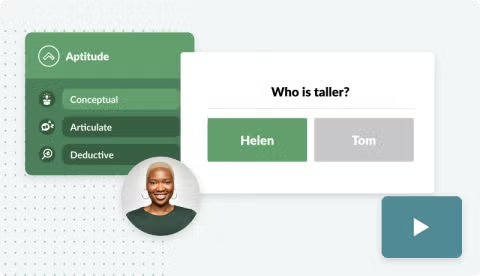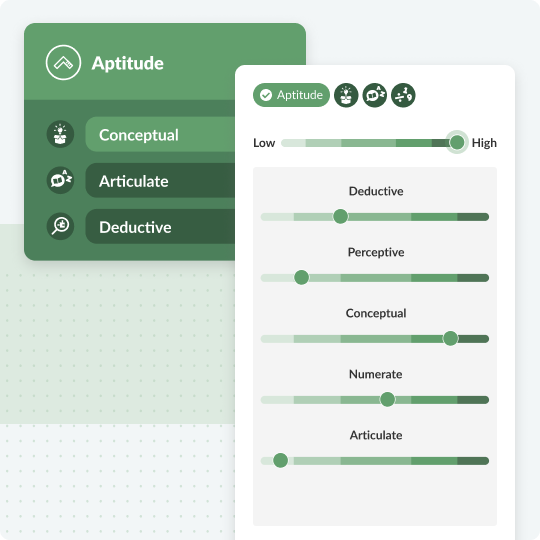Aptitude Tests & Assessments
The most accurate way to predict a successful hire
- Predict success in a role
- Recruit candidates who adapt & learn quickly
- Create high performing teams
- Keep your team engaged and inspired in their roles
- Identify future high-performers


Check out the latest reviews from our most delighted customers
Thomas' Aptitude assessment
The most accurate predictor of job success is looking at aptitude. Measuring aptitude in our platform will show who will perform best in a role, allowing you to build high-performing teams and improve business performance.


Why use the Thomas Aptitude assessment?
Measuring aptitude helps predict a candidate's success in a role. You’ll see how quickly they’ll grasp the skills needed, how they solve problems and the speed in which they learn.
These insights make it easier to select the right candidate, as you’re able to focus on each person’s ability, which is the best predictor of performance in a role as proven by research conducted by the American Psychology Association. When you combine aptitude results with their personality and behavior, you’ll have a higher chance of finding your next top performer.
How the aptitude test works
Our aptitude assessment measures aptitude in 5 areas:
5 Online Assessments
The Thomas Aptitude assessment consists of 5 online tests, including reasoning, perceptual speed, number speed and accuracy, word meaning and spatial visualization
Understand their speed
Gain insights on their mental capacity and how quickly they can learn a new role
Understand general intelligence
The overall percentile is an estimate of a candidate’s general intelligence, focussing on their response to training, mental processing speed, concentration and fast track potential.

Assessment information
- Assessment type: Aptitude
- Format: 5 assessments
- Time to complete: 30-45 minutes
- Training required: None
Validation:
We’re registered with the British Psychological Society and audited against technical criteria established by the European Federation of Psychologists’ Associations. This means our platform is built from science you can trust.
Read a sample candidate profile to see Thomas in action.

We simply would not be where we are today without the Aptitude assessment from Thomas International. The feedback that these assessments provide is invaluable.

The theory
Our aptitude assessment (also known as the General Intelligence Assessment, or GIA), was developed by Dr Peter Dann at the University of Plymouth.
The aptitude assessment looks at an individual's speed of processing information and ability to learn and develop new skills. Our aptitude assessment can be used for recruitment, retention, development, management, identifying training needs, career guidance, succession planning and benchmarking.
Learn how the Thomas Aptitude assessment can help you better understand the learning speed & trainability of your people

Format of the Aptitude test
Our aptitude assessment consists of five tests of measuring cognitive abilities including thought, language, decision making, learning and memory.
Each test has one type of task, and all the questions are an equal level of difficulty. Your score is calculated by the speed and accuracy of your responses and compared to a sample population (the norm group) to determine whether your scores are lower, higher or in-line with the majority of that population.
Each of the five tests measures a specific cognitive function:
Reasoning
Assesses your ability to make inferences, reason from information provided and draw correct conclusions. It also measures your ability to hold information in short-term memory and problem solve.
Perceptual Speed
Assesses your ability to spot errors, ignore irrelevant information and recognize similarities and differences. You’ll be tested on your speed of semantic encoding and comparison.
Number Speed and Accuracy
Assesses your numerical reasoning ability and numerical manipulation. The test measures how comfortable you are working with quantitative concepts.
Word Meaning
Assesses your word knowledge and vocabulary by looking at words from different parts of speech and your ability to identify words that have similar or opposite meanings. The test measures your ability to understand or written or spoken instruction.
Spatial Visualisation
Assesses your ability to create and manipulate mental images of objects. The test measures your ability to work in environments where visualization skills are required by looking at your mechanical reasoning and ability to use mental visualization to compare shapes.

Reliability & validity
The Thomas Aptitude test has undergone rigorous scientific testing to determine its reliability and validity as a psychological assessment.
The GIA is registered with the British Psychological Society (BPS) after it was audited against the technical criteria established by the European Standing Committee on Tests and Testing, part of the European Federation of Psychologists' Associations.
Frequently Asked Questions
What is an aptitude assessment?
An aptitude assessment is a tool for evaluating an individual’s potential to perform well in a specific role. The Thomas International Aptitude Assessment evaluates a range of skills, abilities, and personal traits that are relevant to a candidate’s suitability for a particular position. For example, a coding assessment might evaluate a candidate's proficiency in programming languages and problem-solving abilities, while a mechanical aptitude test might assess a candidate's spatial reasoning and mechanical comprehension for roles in engineering or manufacturing. An aptitude test will predict a candidate’s ability to grasp new concepts, solve problems, and learn quickly. These valuable insights allow for informed decision-making during recruitment.
What are the different types of skills assessment tests for employment?
There are various types of cognitive aptitude tests, all designed to assess different abilities. Verbal reasoning tests evaluate language comprehension and logical thinking skills. Candidates are tested on their ability to understand and analyze written information. Numerical reasoning tests require candidates to interpret and manipulate numerical data presented in tables, graphs, or equations. This demonstrates their ability to perform calculations, analyze data, and draw logical conclusions. Abstract reasoning tests measure the ability to identify patterns and solve abstract problems. Presented with sequences of shapes, symbols, or patterns, they must identify the underlying logic or rules to complete the sequence. Spatial reasoning tests evaluate mental visualization and manipulation of objects in three-dimensional space. Candidates may be asked to rotate or manipulate shapes mentally, visualize objects from different perspectives, or solve spatial puzzles.
Mechanical reasoning tests assess their understanding of mechanical concepts and principles. Candidates are presented with scenarios involving mechanical systems, tools, or processes and must demonstrate their understanding of how these systems work and how they would respond to different conditions.
How can aptitude tests for employment help with hiring?
By selecting the appropriate type of aptitude test based on the specific skills and capabilities required for the job, employers gain valuable insights into candidates' potential for success in the role. For example, a candidate for a customer services role might be tested on their communication skills and problem-solving ability. These assessments help you make informed hiring decisions, identify training needs, and build high-performing teams tailored to their organizational objectives.
What are the benefits of aptitude testing for recruitment?
Assessments used in the recruitment process provide an objective and standardized method of evaluating candidates. By focusing on cognitive abilities rather than qualifications or experience, aptitude testing allows employers to assess a candidate's potential and make data-driven hiring decisions. These tests offer consistency, fairness, and objectivity by removing bias. In the long term, you’ll improve hiring quality, reduce staff turnover, and enhance team performance.
What's the difference between aptitude tests and IQ tests?
Aptitude tests and Intelligence Quotient (IQ) tests are both cognitive assessments, but they measure different aspects of abilities. IQ tests aim to provide an overall measure of an individual's intelligence, including verbal comprehension, logical reasoning, and problem-solving. Aptitude tests focus on specific cognitive abilities and skills relevant to a specific role.
Do aptitude tests predict job performance?
Aptitude tests are strong predictors of how well a candidate will perform in a specific role. However, aptitude tests are more effective when combined with other assessment methods, especially in complex roles. We recommend integrating aptitude assessments into a larger, comprehensive evaluation framework.
How can Thomas help with aptitude testing?
Thomas offers a comprehensive and reliable solution for aptitude testing in the recruitment and selection process. Our aptitude tests measure an individual's cognitive abilities in various key areas, and you’ll gain valuable insights into a candidate’s ability to learn, solve problems, and adapt to new roles. These assessments are designed to identify candidates with the right aptitude for specific job requirements, enabling employers to make informed hiring decisions. We’re experts in psychometric assessments, and all our tests are accurate, valid, and reliable.



